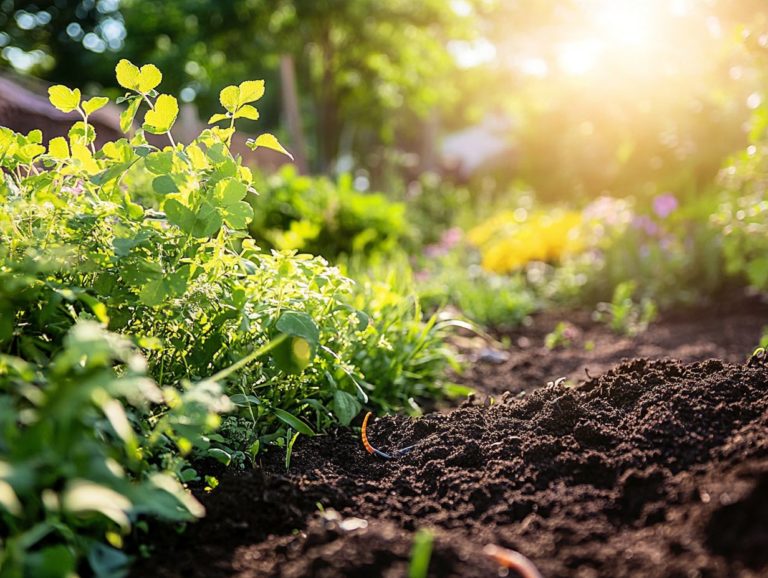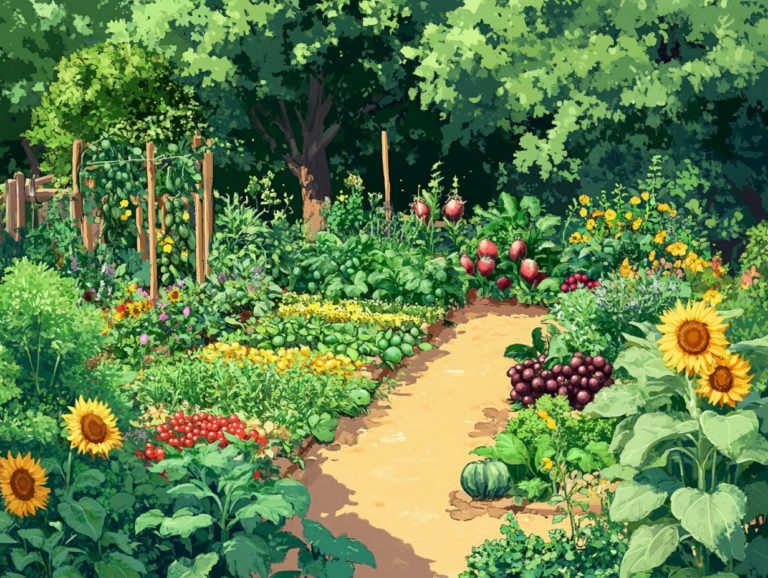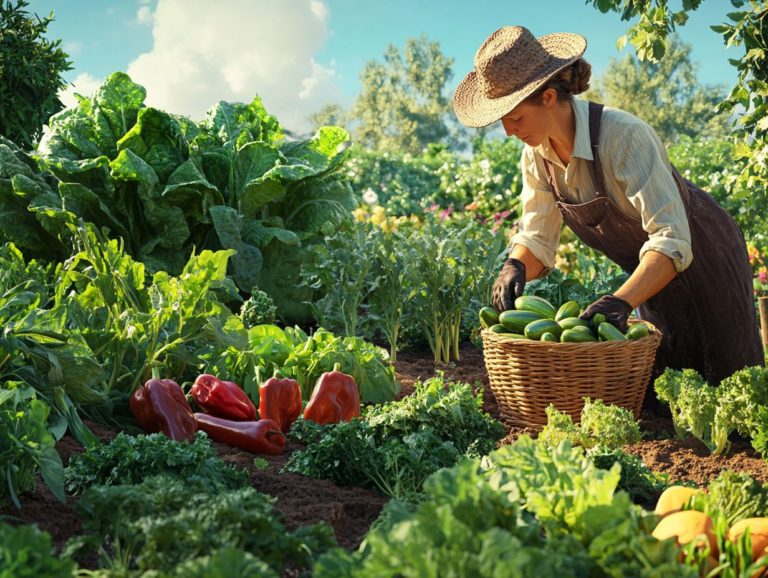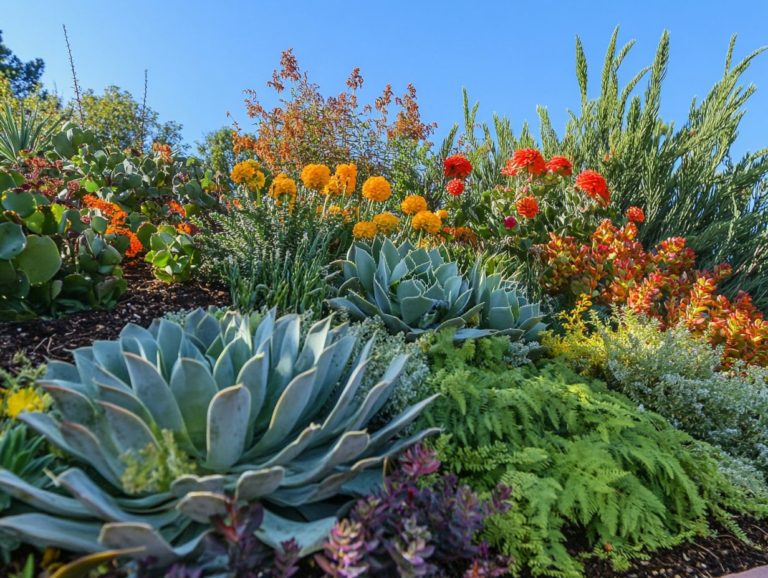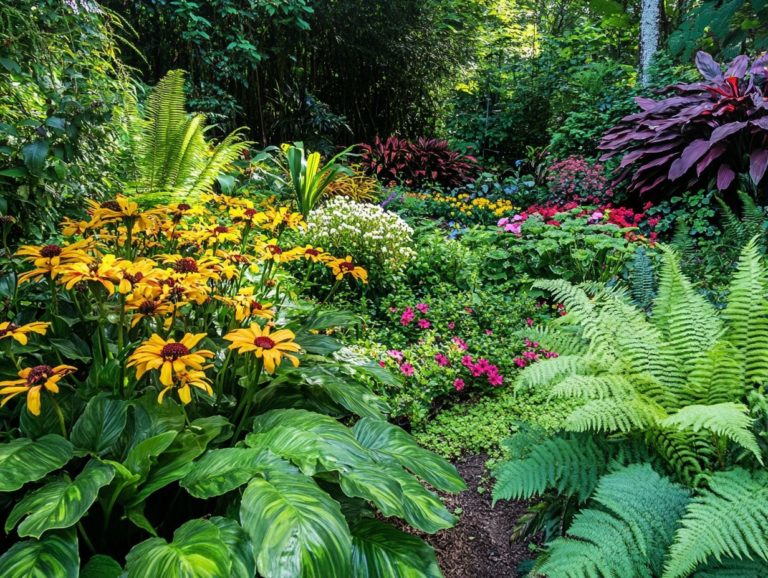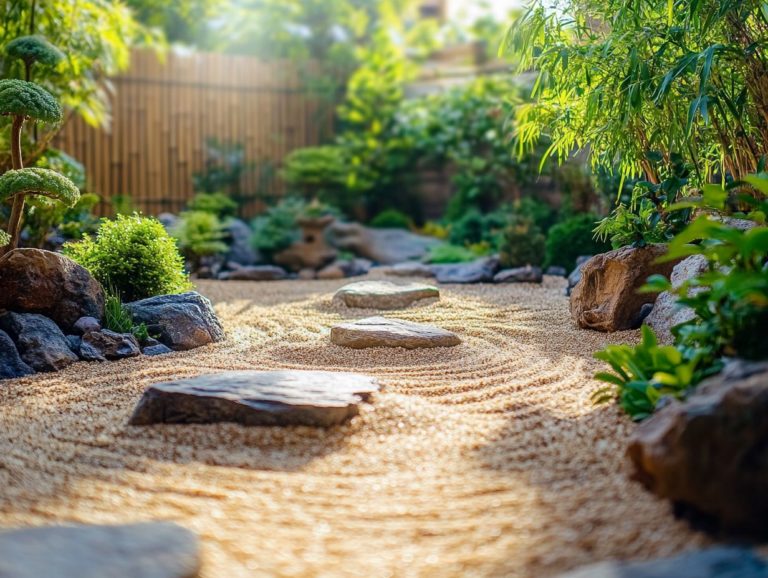“How to Select Seeds for Your Garden”
Choosing the right seeds is vital for your garden’s success. It influences plant health and the harvest yield. Emphasizing the significance of organic seeds and non-GMO options can greatly enhance your growing experience.
This article explains the importance of selecting the right seeds. We will cover open-pollinated and hybrid varieties and the best options for your growing conditions. It addresses crucial factors such as climate, soil conditions, and your personal gardening aspirations. You will also find trustworthy sources for high-quality seeds, including regional suppliers and reputable seed companies.
You ll discover tips for storing and preserving seeds. Proper storage ensures they remain viable for planting in the future, which is particularly beneficial for winter gardening.
Join us on this journey to enhance your gardening experience. Optimize your garden space, especially in small areas.
Contents
- Key Takeaways:
- The Importance of Choosing the Right Seeds
- Understanding Seed Types
- Factors to Consider When Selecting Seeds
- Planting Season and Harvest Time
- Where to Buy Quality Seeds
- Tips for Storing and Preserving Seeds
- Frequently Asked Questions
- What factors should I consider when selecting seeds for my garden?
- How do I know which types of seeds are best suited for my garden?
- Are there any specific varieties of seeds that are better for beginner gardeners?
- Is it necessary to buy organic seeds for my garden?
- Can I save and reuse seeds from my own garden for the next year?
- What are some reputable sources for purchasing high-quality seeds?
Key Takeaways:
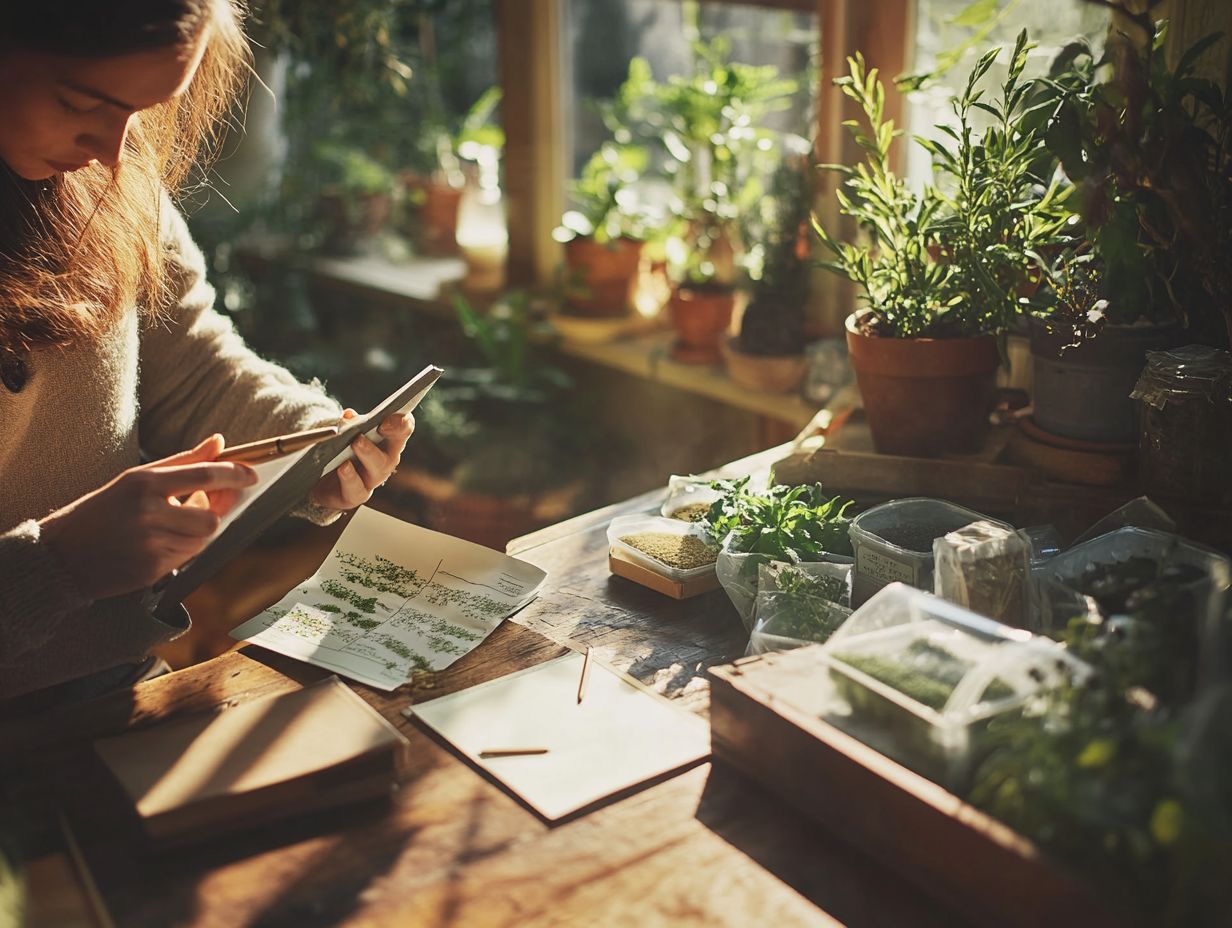
- Choose seeds carefully, as it greatly impacts garden success.
- Understand the difference between open-pollinated and hybrid seeds.
- Consider climate, soil conditions, and personal preferences when selecting seeds.
The Importance of Choosing the Right Seeds
Choosing the right seeds is essential for cultivating a flourishing vegetable garden and achieving your gardening ambitions. Consider heirloom fruits, which are traditional varieties that have been passed down for generations, for added variety. Each type of seed comes with its own specific growing conditions think soil requirements, light exposure, and moisture levels. Understanding these factors is crucial for successful growing.
Many home gardeners underestimate the importance of selecting the ideal seed type be it heirloom or hybrid tailored to their regional climate and a gardening zone determined by climate, to maximize their growing season. This choice influences everything from transplanting seedlings to pest management and impacts your overall gardening goals.
By dedicating time to thoughtful garden planning and sourcing high-quality seeds from local suppliers, such as Southern Exposure Seed Exchange or Sow True Seeds, you can optimize your garden space and reap a bountiful harvest during the growing season.
Impact on Garden Success
The impact of selecting the right seeds on your garden’s success is immense; it directly affects the health and yield of your plants, making it essential to choose the best seed for your conditions. Choosing a variety that suits your climate and soil type is vital, as it lays the foundation for vibrant growth and a bountiful harvest influenced by the USDA hardiness ratings.
Incorporating various gardening techniques, like companion planting, can help you maximize space in small space gardens while fostering a healthier ecosystem. Be mindful of common mistakes that many gardeners encounter, such as overwatering or planting seeds too deeply. Both can hinder germination and overall plant vigor, which are often discussed in garden tips.
To further enhance your yield, consider implementing effective pest control measures and utilizing organic gardening tips, which are vital for maintaining healthy plants and minimizing pests. These strategies can significantly improve your plants’ resilience and productivity, ensuring your garden flourishes throughout the growing season.
Understanding Seed Types
Understanding the various seed types, including heirloom seeds, is crucial for you as a gardener. It impacts everything from germination rates the speed at which seeds sprout to the overall health of your plants during the growing season.
You can choose between heirloom seeds and hybrid seeds. Each boasts unique characteristics and advantages often highlighted in seed catalogs. Heirloom seeds are typically non-GMO and organically grown. They are cherished for their rich flavors and resilience in diverse growing conditions, making them a staple for home gardeners.
On the other hand, hybrid seeds may provide enhanced resistance to pests and diseases, catering to those who require robust growing methods.
As you explore seed catalogs, such as those from Baker’s Creek Heirloom Seed Company, you ll find amazing options waiting for you! They offer an extensive array of vegetable varieties that align perfectly with your specific growing conditions.
Open-Pollinated vs. Hybrid Seeds
Open-pollinated seeds and hybrid seeds are two essential categories to familiarize yourself with when planning your garden. Each presents its own set of unique benefits and challenges in garden planning.
Open-pollinated seeds are prized for their ability to produce offspring that are true to their type in subsequent generations. This supports sustainability in gardening. You can save seeds from your most successful plants without worrying about unexpected variations. This is a key advantage for home gardeners aiming for consistency.
In contrast, hybrid seeds though often engineered for vigorous growth and disease resistance may not deliver the same quality or characteristics when replanted, prompting caution among seed suppliers.
When navigating the world of seeds, look for trusted companies like Seed Savers Exchange and Baker Creek Heirloom Seeds, as well as No. 9 Farms for heirloom options. They offer a diverse selection of open-pollinated options alongside hybrids, enabling you to choose the right seeds for your needs while supporting biodiversity and sustainability.
Factors to Consider When Selecting Seeds
When selecting seeds, consider several key factors crucial to your garden’s success, including your light requirements and how to grow plants effectively. Think about your local climate, soil conditions, and your personal gardening goals. This is especially important when considering the significance of USDA hardiness zones, a system that classifies regions based on their coldest temperatures.
Understanding your region’s specific growing conditions is essential for choosing seeds that will thrive during your growing season. You’ll want to know the optimal planting season and harvest time for various vegetable varieties to ensure successful spring gardening.
Soil conditions, including pH levels the measure of how acidic or alkaline your soil is and moisture retention, will significantly impact which seeds flourish in your garden, especially when considering transplant seedlings.
Reflect on your personal preferences whether you lean towards heirloom vegetables or non-GMO options. These choices will greatly shape your gardening experience and satisfaction with the harvest, particularly in family favorites.
Climate and Soil Conditions

Climate and soil conditions are essential factors to consider when selecting seeds for your vegetable garden, especially regarding garden conditions.
Understanding USDA hardiness zones can significantly influence your choices. They categorize regions based on average minimum temperatures, which is vital for effective garden planning. This knowledge helps you identify which plants will thrive in your specific environment, particularly when selecting local seed varieties.
The health of your soil, including its drainage capabilities and nutrient content, plays a crucial role in seed germination and overall plant development. Adding compost is essential.
For example, varieties like tomatoes and peppers flourish in well-drained, nutrient-rich soils and warmer zones. In contrast, leafy greens such as kale and spinach can tolerate the cooler climates commonly found in northern regions, showcasing the diversity of vegetable varieties.
By considering both climatic factors and soil quality, you can make informed decisions that enhance your yield and ensure robust plant growth throughout your growing season.
Planting Season and Harvest Time
Knowing the right planting season is essential for a successful vegetable garden. This is especially important when considering frost-free days.
Understanding different planting seasons helps you select the appropriate seeds and ensures your garden thrives. This leads to a delightful array of produce throughout the year, which is crucial for spring gardening. For example, cool-season vegetables like lettuce and radishes flourish in early spring. In contrast, warm-season varieties like tomatoes and peppers thrive in the warmth of late spring, making them favorites among many home gardeners.
This strategic timing influences the quality and flavor of your vegetables. It s imperative to sync your planting schedules with the seasons, a key part of successful garden planning.
Plan your sowing and harvesting now for a bountiful yield that will tantalize your taste buds! By organizing when to sow and harvest, you can enjoy home-cooked meals prepared with your fresh produce.
Personal Preferences and Goals
Your personal preferences and gardening goals shape the seed selections for your garden. Consider heirloom seeds for their unique traits.
From cherished family favorites to your own tastes, every gardener has a distinct palette that influences their seed choices. This includes options like GMO (genetically modified organisms) and non-GMO. If your household enjoys home-cooked meals, prioritize vegetable varieties that burst with flavor and cater to specific dietary needs, such as organic or gluten-free options. This smart approach guarantees a harvest that will delight your taste buds and elevate your meals!
When selecting seeds, consider sustainability. Choosing heirloom varieties helps preserve genetic diversity and promotes biodiversity in your area. By aligning your seed choices with personal preferences and broader gardening goals, you cultivate a garden that nourishes both body and soul while incorporating gardening techniques that reflect your unique style.
Where to Buy Quality Seeds
Locating high-quality seeds is crucial for your garden’s success. Seed suppliers play a vital role in this process. You have various options, from local nurseries to specialized seed suppliers, both in-store and online, including No. 9 Farms and Stephanie Oaks.
Each choice presents distinct advantages, allowing you to select what best suits your gardening needs, whether you prefer heirloom seeds or hybrid seeds.
Local Nurseries and Seed Companies
Local nurseries and seed companies are essential allies for gardeners. They provide an extensive range of non-GMO and organic seeds suited to your regional growing conditions, reinforcing the importance of the right seeds.
Beyond their impressive selection, these establishments offer expert advice tailored to the unique climates and soil types you encounter. This positioning makes them foundational resources for successful planting, especially useful for garden tips. The knowledgeable staff share insights on optimal planting times, effective pest management, and thoughtful crop rotations that can significantly boost your garden yields, helping you avoid common seed mistakes.
Renowned companies like Seed Savers Exchange and Botanical Interests specialize in organic options, ensuring your gardening practices remain sustainable. By sourcing seeds locally, you cultivate healthier plants while supporting the community and helping to preserve biodiversity in your region.
Online Seed Suppliers
Online seed suppliers offer a remarkably convenient avenue for you to access an extensive variety of seeds, including those elusive heirloom and organic options that are often hard to find. When selecting the best seed varieties, understanding growing conditions is crucial.
Shopping online saves you the hassle of going to local nurseries. You’ll discover a wider range of seed options than in physical stores.
With just a few clicks, you can explore an array of varieties, delve into detailed descriptions, and even compare prices across multiple suppliers.
As you navigate these digital marketplaces, it’s essential to exercise discernment. Selecting reputable online suppliers can significantly impact your gardening success, so keeping an eye on reviews and ratings is crucial. Positive feedback from fellow gardeners serves as a valuable compass, ensuring that high-quality seeds are merely a cart away.
Tips for Storing and Preserving Seeds

Effectively storing and preserving seeds is crucial for maintaining their ability to grow and ensuring your garden flourishes in future growing seasons. Act now to protect your seeds and ensure a bountiful harvest!
Proper Storage Techniques
Proper storage techniques are essential for maintaining seed viability, ensuring that your seeds remain healthy and primed for planting in the next growing season.
To achieve this, consider utilizing refrigerated storage methods; they can significantly lower moisture levels, thus extending the shelf life of your seeds. Incorporating desiccants also absorbs excess humidity, creating an optimal environment for your seeds.
Make it a habit to regularly check your seeds. This simple step boosts your chances of a thriving garden! It allows you to assess whether the seeds are still capable of growing and to detect any signs of mold or deterioration early on. By prioritizing these careful storage practices, you can enhance your chances of successful germination and enjoy a bountiful harvest.
Seed Saving and Preservation Methods
Seed saving is essential for gardeners who want to keep heirloom seeds alive and thrive across seasons. You also need to understand your soil to succeed.
Master proper harvesting, drying, and labeling techniques to create a sustainable gardening cycle. Knowing the genetic traits of your plants helps you breed stronger varieties for the future.
Effective seed saving enhances biodiversity in your garden. With dedication, you can build a seed bank that suits your climate and soil, deepening your connection to gardening.
Frequently Asked Questions
What factors should I consider when selecting seeds for my garden?
When choosing seeds for your garden, consider the type of plant, your garden’s growing conditions, and your preferences. Some plants need specific soil or light exposure, while others are more tolerant. Additionally, think about the size and layout of your garden, as certain plants may require more space to grow.
How do I know which types of seeds are best suited for my garden?
The best way to determine which seeds are right for your garden is to research the plants you want to grow. Look into their ideal growing conditions, expected size and yield, and potential challenges or pests. You can also consult with local gardening experts or ask for recommendations at your local nursery.
Are there any specific varieties of seeds that are better for beginner gardeners?
Yes, some vegetable seeds are easier for beginner gardeners. Look for low-maintenance options like herbs, leafy greens, and certain tomatoes and peppers. Choose resilient seeds that thrive in various conditions.
Is it necessary to buy organic seeds for my garden?
While organic seeds are popular, they aren t required for a successful garden. Your choice is up to you! Remember, organic seeds alone won t guarantee an entirely organic garden; soil and pest management also matter.
Can I save and reuse seeds from my own garden for the next year?
Yes, you can save seeds from your garden for next year. However, success depends on the plant type and your seed-saving skills, which means collecting and storing seeds properly. Label them to keep track of their viability.
What are some reputable sources for purchasing high-quality seeds?
Looking for reliable sources to buy high-quality seeds? You have a wealth of options, including online seed companies, local nurseries, and garden centers.
Some notable suppliers are Southern Exposure Seed Exchange, Sow True Seeds, Baker s Creek Heirloom Seed Company, and No. 9 Farms. Always research the source before purchasing to ensure quality.
Read reviews and ask fellow gardeners for recommendations. Opt for certified organic or non-GMO seeds to guarantee the best for your garden!

